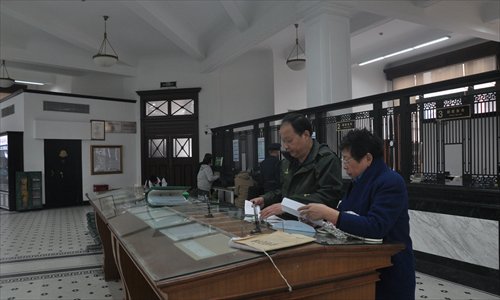HOME >> METRO SHANGHAI
You’ve got mail!
By Huang Lanlan Source:Global Times Published: 2014-12-14 17:43:01
The changing face of the post office in Shanghai

The bell tower on the Shanghai General Post Office Building which has been standing beside the Suzhou Creek for 90 years Photo: Courtesy of Zhou Lian
Just about every day before dawn, 39-year-old Ye Qidong begins work at the Caoyang New Village Post Office in Putuo district. One of the 6,000 mailmen working in the city, Ye puts letters and parcels into his mailbag, straps this to his bike and cycles to the residential compounds on his route, delivering the mail.
It's not always easy, especially at this time of year when his hands are numb from the cold and it's hard to put some of the letters into the small mailboxes.
Every day he delivers nearly 2,000 letters, newspapers and parcels. This would be more straightforward, he explains, if so many of these weren't incorrectly addressed. Every day he has at least one letter that is wrongly addressed. On a bad day last summer he had six badly addressed letters including one sent to a primary school student. "The address on the envelope was to 'the noodle shop at No.7 Caoyang Village.' But at this village I found several noodle shops."
China Post rules say that wrongly addressed mail can be abandoned or returned to the sender. But Ye likes to do his job and tries a little harder than some. Since he became a mailman in 1998, Ye has delivered more than 3 million letters, newspapers and parcels, and has never abandoned or sent back to the sender one piece of mail.
"I tried to find every letter's recipient," he said. "I would be very concerned if I couldn't deliver a letter to the right person."
The right people
He spends quite of a bit of his own time searching for the right people for wrongly addressed letters. Last month, he had trouble with a letter from Germany. There was an address written in Chinese but it was almost impossible to read. However there was a telephone number on the envelope. "The address was wrong and when I tried the phone number it was answered by someone living in Guangdong Province."
To find the right recipient, Ye spent six days making inquiries door-to-door - after he had completed his normal working day - and finally he found the right person. A young woman living with her grandparents was the intended recipient and she was really surprised and moved to get a letter from her German friend.
Most of the time, Ye gets the correct addresses using the post office database or checking local police stations and community committees. "But this only works for Chinese names and addresses." If a foreign language is involved he has to check with different streets and different people as he tries to track down the recipient.
In the early 2000s, Ye had to deal with a letter addressed in German. " It just had the name of a road, a lane number and the number 16 after this. I had no idea." It took him a few days asking around but eventually he did find the address where some German expats were living.
Ye has worked at the Caoyang New Village Post Office for 17 years. This post office serves an 8-square-kilometer area packed with commercial buildings and residential compounds and delivers mail to more than 250,000 residents and businesses. "There are nine villages in this area, and most of the residents there are migrant workers," explained the post office's vice director, Dong Shunlin.
This also presents difficulties for the mailmen whose dedication is not always appreciated. In 2008 Ye spent days tracking down a man whose letter had been wrongly addressed. Eventually he tracked the address to a house but then discovered the man had moved on. Much hard work later he found the man who then told him to go to hell. "I don't need or want this letter."

Mailman Ye Qidong (left) sorts out newspapers at the Caoyang New Village Post Office before setting out on his round. Photo: Huang Lanlan/GT
No longer respected
Today being a mailman no longer earns the respect it once had. "It seems that no one appreciates mailmen," Dong told the Global Times.
Just last month a security guard in a residential block refused to let one of the mailmen in to deliver a registered letter, a bank statement. "The guy said that his job was to stop strangers from entering the building," Dong said. Dong himself had to go to the building and explain that a registered letter meant that the mailman had to deliver this in person.
And people who don't understand the system sometimes complain that the post office hasn't delivered their parcels. "We are a post office, not an express delivery company," Dong said. "The post office regulations say that people have to go a post office to collect parcels."
In the 1980s the now 56-year-old Dong worked as a mailman himself. Back then the job of a mailman was highly regarded and rated as one of China's three "golden rice bowl" jobs offering stable employment with good benefits (the other golden bowls were jobs with banks and the railway). "I was proud to be a mailman in those days." At the weekends he was even reluctant to stop wearing his uniform.
Dong loved his work then. When he arrived at residential compounds on his bike he would ring his bell loudly. "When they heard my bell everyone would come to their doors with smiles, waiting for me to hand them their letters." At Spring Festival his clients stuffed sweets and peanuts into his mailbag.

Customers fill in forms at the Shanghai General Post Office Building. Photo: Huang Lanlan/GT
Turned away
Today at these compounds mailmen have to suffer being turned away by security guards or property management staff members, or encountering major security gates everywhere. They no longer have a personal relationship with the people they are bringing mail to. Today the mailmen are only allowed into buildings briefly after they have explained themselves to security guards and then they have stuff their letters into mailboxes without actually encountering any of the residents. "They feel like criminals," Doing said.
Alongside Ye, there are 42 mailmen at Dong's post office. They usually work from 6 am to 8 pm and have no regular weekends off - they get five or six days off every month. Most are paid less than 4,000 yuan ($646.80) a month.
It's hard work and not well paid. A lot of people try it but most give the work away after a few months. "In the 1980s, anyone wanting to be a mailman had to have graduated from high school and their parents had to have been politically approved," Dong said. Today the post office has few requirements for potential employees but there are few willing to take up the work.
Post office worker Geng Zhongping has worked in the Shanghai General Post Office Building for more than 30 years. The 90-year-old building, on Tiantong Road near the Suzhou Creek, is one of the largest and oldest post office buildings in China. Before the 1980s, this was the clearing house for almost all of the city's letters and parcels.
Geng said that after China began opening up in 1978, postal services in Shanghai developed rapidly and by the 1980s the building was inundated with letters and parcels. "There was mail everywhere," Geng said. "It was piled up everywhere, in the courtyard and along corridors. Some of my colleagues had to work on balconies."
In 2003 a new 58,000-square-meter distribution center was opened in Pudong New Area and the operations moved there. Mail from outside the city is taken to the center where it is sorted into postcode regions and taken to the more than 500 post offices across the city where it is sorted again and given to mailmen like Ye to deliver.
Experienced staff
Geng said that there were experienced staff at the Pudong mail center who translated English and pinyin addresses into Chinese and stuck the translation onto the envelopes.
Up to November, Shanghai Post this year has handled more than 6 million letters and 120,000 parcels to or from other countries. Zhang Hui, a media officer at Shanghai Post, said that there were staff members who could speak basic English at most of the city's post offices. "Anyone needing English services can ask them for help, or call Shanghai Post's service hotline 11185 where there are English-speaking staff members ready to offer a helping hand."
In recent years, the postal service has faced new challenges as mobile phones, Internet and express delivery companies have flourished. Shanghai Post is trying to embrace the new technology and is introducing a range of new services. In November Shanghai Post introduced QR codes for parcels which means people wanting to mail a parcel no longer have to go to a post office but can send their parcels by scanning and dropping the parcel at one of the 3,000 post boxes around the city.
Posted in: Metro Shanghai, City Panorama